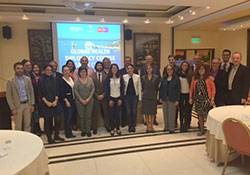Global health diplomacy course for small countries held in Cyprus

WHO
Dr George Pamboridis, Minister of Health, Republic of Cyprus, opened the global health diplomacy course for small countries on 13 March 2017, held in Nicosia, Cyprus.
“Cyprus is hosting this global health diplomacy course, the second Small Countries Initiative that the country has had the pleasure of holding in the past year. This underlines the importance Cyprus places on this initiative, as well as the essential need to create a platform for sharing experiences and mutual learning,” said Dr Pamboridis.
35 senior level participants from various sectors including finance, foreign affairs, education, development corporations as well as ministries of health are attending, as well as representatives of the WHO Regions for Health Network.
Explaining the relevance of the course, Mr Josep M. Casals Alis, Head of Food Safety and Environment at the Ministry of Health of Andorra commented, “This is a very rich and useful course, that allows small Member States in the WHO European Region to understand better the complex procedures, mechanisms, and public and private bodies that are involved in health issues and how priorities on global health are set. It offers a practical approach in terms of how countries can implement global and regional agendas through national and sub-national health policies and programmes".
The three day course has been developed by the Graduate Institute Geneva, together with WHO/Europe to provide participants from small countries with an understanding of key concepts and mechanisms for governance for health, in the context of the 2030 Sustainable Development Agenda. Specific issues addressed on the course include considering diplomacy challenges related to the resilience and vulnerability of the health workforce, and using global and regional policy documents to address national issues such as promoting healthy food. The course is delivered through a combination of lectures, informal discussions, group work and negotiation exercises.
“This course has been enlightening and motivating, and a great opportunity to meet the diverse experts as well as learn and share experiences with all other representatives of small European countries, supplemented with very good exercises,” concluded Mr Thordis Sigurdardottir, Director, Bilateral Development Cooperation at the Ministry of Foreign Affairs, Iceland.
A future course is planned in Latvia for the Nordic countries in the latter part of 2017.



